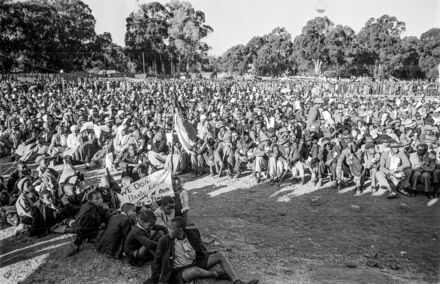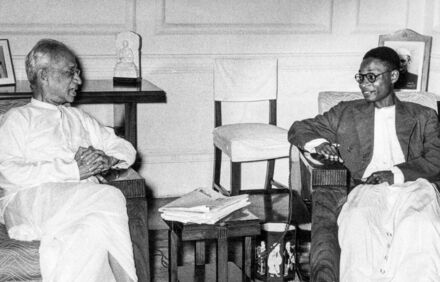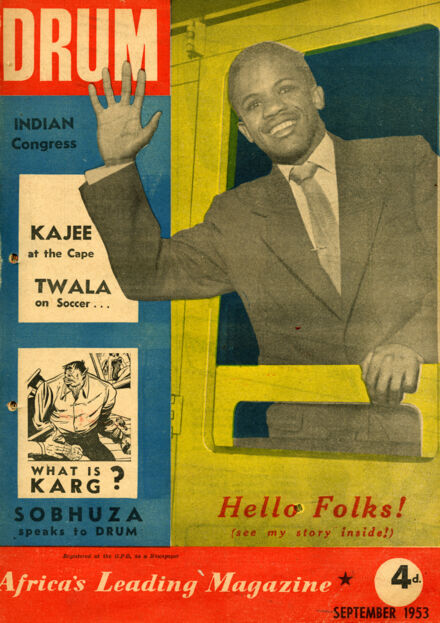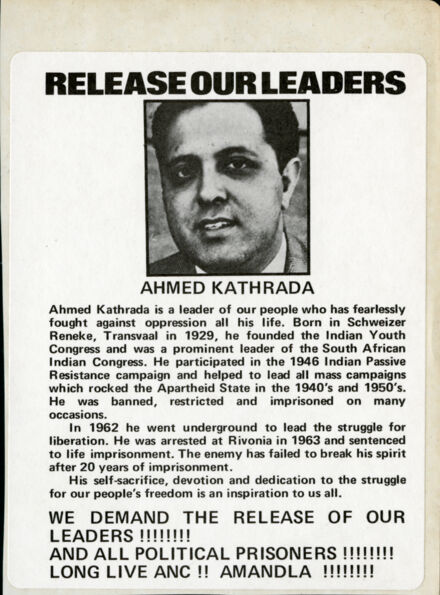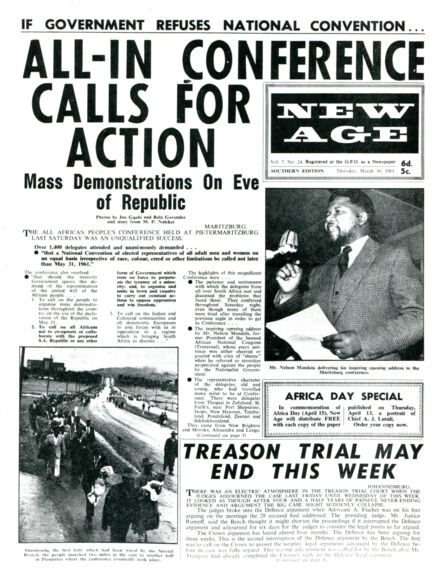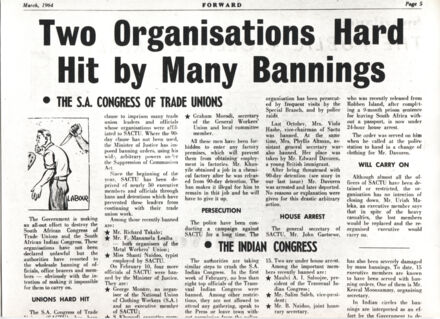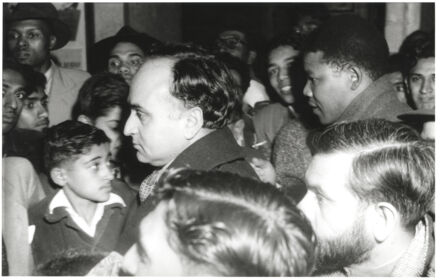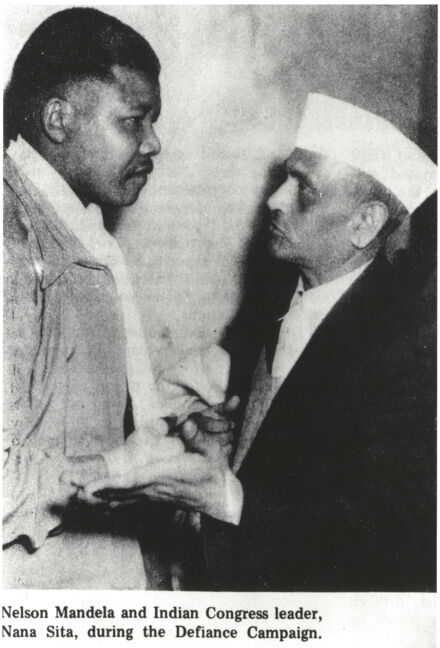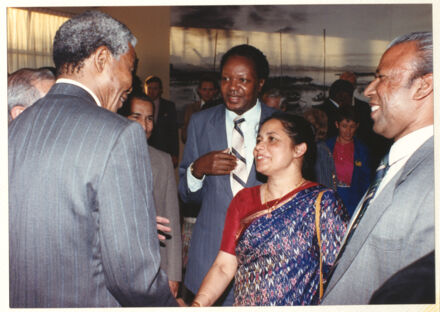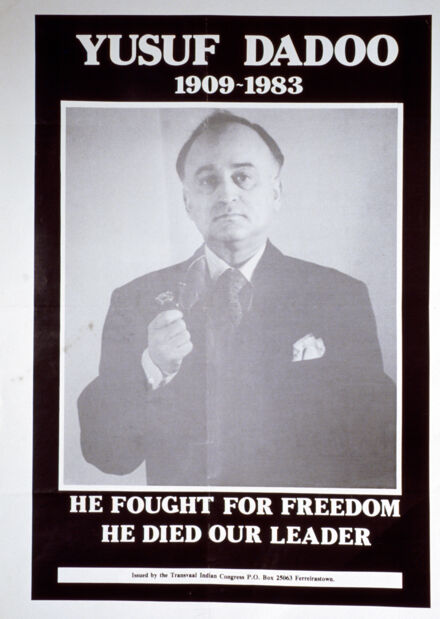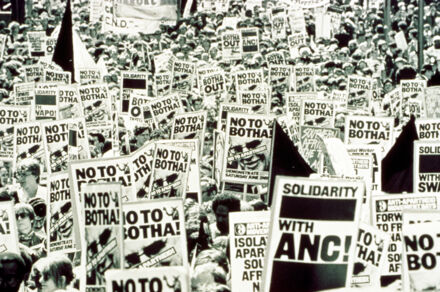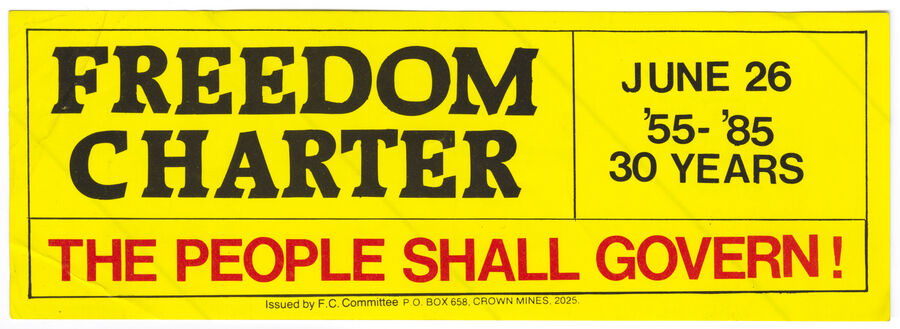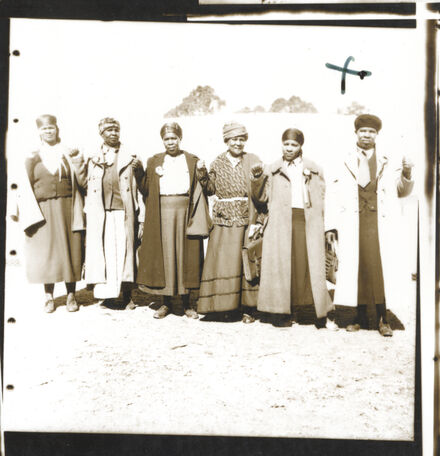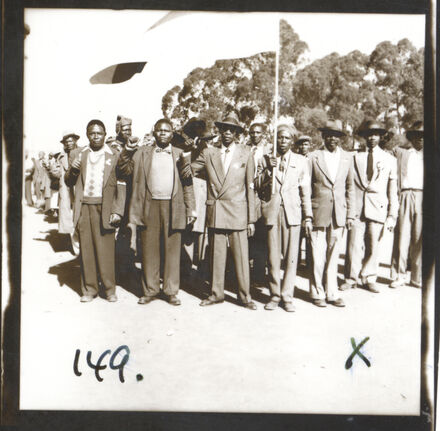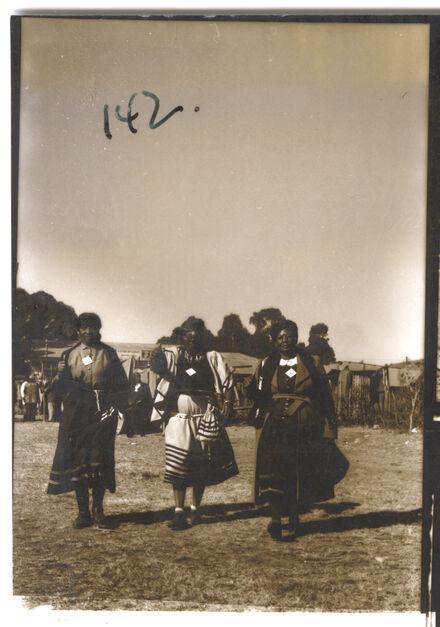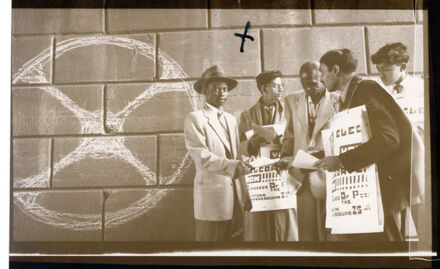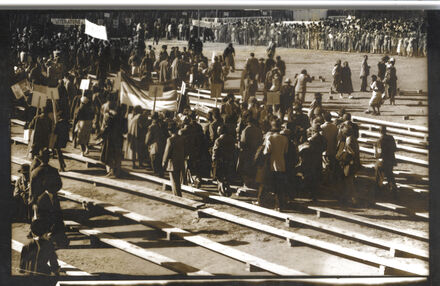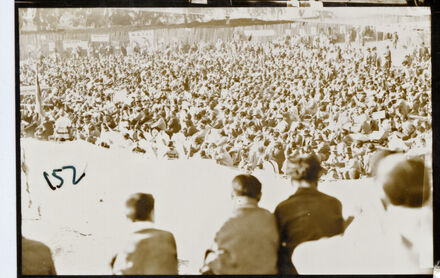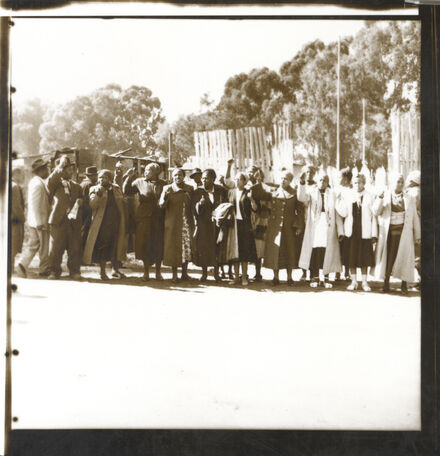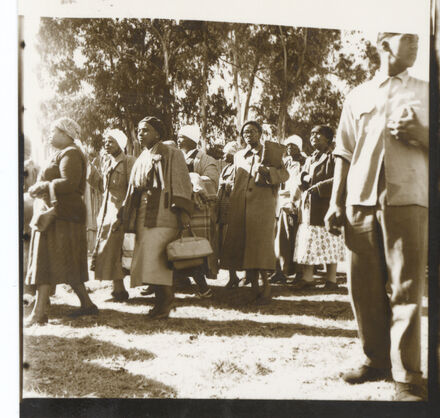Search page
APN759119
Creator: Drum Social Histories Description: The Vice President, Dr. S. Radhakrishnan in conversation with Mr. Abubakar Mayanja, a prominent leader of Uganda, when the latter called on the Vice President in New Delhi on August 22. Mr. Abubakar Mayanja is on a 5 week visit to this country on the invitation of the Indian Council of Cultural Relations.APN758546
Creator: Drum Covers Description: Indian Congress; Kajee at the Cape; Twala on Soccer; Hello Folks! Veso: Jake Tuli – Boxing champion's own story of his year overseas.APN757058
Creator: ANC Archives Description: Sticker Release our Leaders AHMED KATHRADA Ahmed Kathrada is a leader of our people who has fearlessly fought against oppression all his life. Born in Schweitzer Reneke, Transvaal in 1929, he founded the Indian Youth Congress and was a prominent leader of the South African Indian Congress. He participated in the 1946 Indian Passive Resistance campaign and helped to lead all mass campaigns which rocked the Apartheid State in the 1940's and 1950's. He was banned, restricted and imprisoned on many occasions. In 1962 he went underground to lead the struggle for liberation. He was arrested at Rivonia in 1963 and sentenced to life imprisonment. The enemy has failed to break his spirit after 20 years of imprisonment. His self-sacrifice, devotion and dedication to the struggle for our people's freedom is an inspiration to us all. WE DEMAND THE RELEASE OF OUR LEADERS!!!!!!!!! AND ALL POLITICAL PRISONERS!!!!!!!! LONG LIVE ANC !! AMANDLA !!!!!!!!APN755579
Creator: ANC Archives Description: IF GOVERNMENT REFUSES NATIONAL CONVENTION... ALL-IN CONFERENCE CALLS FOR ACTION Mass Demonstrations On Eve of Republic Photos by Joe Gqabi and Bala Govcndcr and story from M. P. Naicker MARITZBURG. T»HE ALL AFRICAN People's CONFERENCE HELD AT PIETERMA RITZBURG LAST SATURDAY WAS AN UNQUALIFIED SUCCESS. Over 1,400 delegates attended and unanimously demanded . . . • "that a National Convention of elected representatives of all adult m en and women on an equal basis irrespective of race, colour, creed or oth er limitations be called not later than May 31, 1961" £LiiiiiiiiiiiiiimwiimimimiiiiiMiiiimmiiimimiiiimimiiiiimimimmiiiiiiiiimiuiiiiimimiiii imiiiiimiii£ = Vol. 7. No. 24. Registered at the G.P.O. as a Newspaper £ J = | SOUTHERN EDITION Thursday, March 30. 1961 5c. 1 aillllllllllllllllllllllllllllllllllllllllllllllllllllllllllllllllllllllllllllllllllllllllllllllllllllllllllllllllllllllllllllllllllllini The confcrcnce also resolved: # "that should the minority Government ignore this demand of the representa tives of the united will of the African people . . . 1. To call on the people to organise mass demonstrations throughout the country on the eve of the declaration of the Republic on May 31. 2. To call on all Africans not to co-operate or collaborate with the propos ed S.A. Republic or any other form of Government which rests on force to perpetuate the tyranny of a m inority: and. to organise and unite in town and country to carry out con stant actions to oppose oppression and win freedom. To call on the Indian and Coloured communities and all democratic European s to join forces with us in opposition to a regime which is bringing South Africa to disaster . . ." The highlights of this magnificent Conference were . . . # The patience and seriousness with which the delegates from all over So uth Africa met and discussed the problems that faced them. They conferred throughout Saturday night, even though many of them were tired after t ravelling the previous night in order to get to Conference . . . # The inspiring opening address by Mr. Nelson Mandela, former President of the banned African National Congress (Transvaal), whose every sentence was either cheered or greeted with cr ies of "shame" when he referred to atrocities perpetrated against the p eople by the Nationalist Government. # The representative character of the delegates, old and young, who had travelled many miles to be at Conference. There were delegates from Thogazi in Zululand; St. Faith's, near Port Shepstone; Ixopo, Ne w Hanover, Tembu-land, Pondoland, Zeerust and Sekhukhuneland. They came from New Brighton and Moroka. Alexandra and Langa, (Conti nued on page 3) Mr. Nelson Mandela delivering his inspiring opening address to the Marit zburg conference. AFRICA DAY SPECIAL In commemoration of i published on Thursday, Africa Day (April 15), New Ap ril 13, a portrait of Age will distribute FREE | Chief A. J. Lutuli. with each copy of the paper 'Order your copy now. TREASON TRIAL MAY .APN755575
Creator: ANC Archives Description: March, 1964 FORWARD Page 5 Two Organisations Hard Hit by Many Bannings THE S.A. CONGRESS OF TRADE UNIONS The Government is making an all-out effort to destroy the South African Congress of Trade Unions and the South African Indian Congress. These organisations have not been declared unlawful but the authorities have resorted to the wholesale banning of officials, office bearers and members - obviously with the intention of making it impossible for them to carry on. UNIONS HARD HIT The S.A. Congress of Trader • /OiPfTlh 1___ clause to imprison many trade union leaders and officials whose organisations were affiliated to SACTU. Where the 90-day clause has not been used, the Minister of Justice has imposed banning orders, using his w id.% arbitrary powers un Vr the Suppression of Communism Act. Since the beginning of the vent. SACTU has been deprived of nearly 50 executive members and officials through bans and detentions which have prevented these leaders from continuing with their trade union work. Among those recently banned are: if Mr. Richard Takalo; if Mr. F. Manamela 'Lesiba - both organisers of the Metal Workers' Union; â˜"¦ Miss Shanti Naidoo, typist employed by SACTU. On February 10, four more officials of SACTU were banned by the Minister of Justice. They are: if George Monare, an organiser of the National Union of Clothing Workers (SA.) and an executive member of SACTU; JL Q I^tinnirali ovoonf!*rn mam. if Graham Morodi, secretary of the General Workers' Union and local committee member. All these men have been forbidden to enter any factory premises, which will prevent them from obtaining employment in factories. Mr. Khun-yield obtained a job in a chemical factory after he was released from 90-day detention. The ban makes it illegal for him to remain in this job and he will have to give it up. PERSECUTION The police have been conducting a campaign against SACTU for a long time. The organisation has been persecuted by frequent visits by the Special Branch , and by police raids. Last October, Mrs. Viola Hashe, vice-chairman of Sactu was banned. At the same time, Mr9. Phyllis Altman, assistant general secretary was also banned. Her place was taken by Mr. Edward Davoren, a young British immigrant. After being threatened with 90-day detention (see story in our last issue) Mr. Davoren was arrested and later deported. No reasons or explanation we re given for this drastic arbitrary action. HOUSE ARREST The general secretary of SACTU, Mr. John Gaetsewe. THE INDIAN CONGRESS The authorities are taking similar steps to crush the S.A. Indian Congress. In the first week of February, no less than eight top officials of the Transvaal Indian Congress were banned. Among other restrictions, they .APN755559
Creator: ANC Archives Description: South Africa, 1952, PHOTO: ANC Archives: Nelson Mandela and Yusuf Dadoo after their arrest during the Defiance Campaign 1952.APN755555
Creator: ANC Archives Description: South Africa, Early 1950s, PHOTO: ANC Archives: Nelson Mandela and Indian Congress leader, Nana Sita, during the Defiance Campaign 1952.APN755433
Creator: ANC Archives Description: Geneva Ecumenical Centre, Geneva, Switzerland, 19900601. PHOTO: ANC Archives. A few months after his release from prison, newly elected Deputy President of the African National Congress (ANC) Nelson Mandela and his wife, Winnie Madikizela-Mandela make an official visit to Switzerland, 4-9 June 1990. Shortly after his arrival in Geneva, he visits officials and staff members of the World Council of Churches (WCC) and other organisations. Amongst the guests Nelson Mandela meets Director of the Commission of the Churches on International Affairs (CCIA) Dr Ninan Koshy (right) and his wife Susan Koshy (centre) wearing a traditional Indian saree. During this visit, Nelson Mandela expresses his gratitude to the church for its support of the anti-apartheid struggle.APN755246
Creator: ANC Archives Description: London, United Kingdom, Date Unknown. PHOTO: ANC Archives. Dr Yusuf Dadoo was a leader of the Transvaal Indian Congress and was very instrumental in the formation of the Doctors Pact. The pact was signed by Dr Naicker of the Natal Indian Congress, Dr Yusuf Dadoo of the Transvaal Indian Congress and Dr Xuma of the African National Congress. This is a poster commemorating his life on the occasion of his death. The poster reads: Yusuf Dadoo 1909-1983. He fought for freedom. He died our leader. Issued by the Transvaal Indian Congress.APN754082
Creator: ANC Archives Description: Location and Date Unknown. PHOTO: ANC Archives. 'No to Botha and Solidarity with ANC!' written on posters carried by marchers at an anti-apartheid march. This may have been at the time of the referendum called by President Botha for White voters to decide on the parliament, on 2 November 1983. The resistance movements within the country and outside the country called for a 'No' vote by White voters since Black South Africans were left out of the deal and only Indian and Coloured South Africans were included in Botha's deal. There are some banners in this protest from the Committee on Nuclear Disarmament (CND).APN753446
Creator: ANC Archives Description: South Africa, 19850626. PHOTO: ANC Archives. Poster of "Freedom charter. The people shall govern! June 26, '55-'85, 30 years" . Issued by F.C. Committee, Crown MinesAPN753436
Creator: ANC Archives Description: Kliptown, Johannesburg, Transvaal (now Gauteng), South Africa, 19550625. PHOTO: Eli Weinberg. Six women make the thumbs up salute the sign for unity initiated by the African National Congress (ANC) in the Cape in 1949. They are delegates attending the Congress of the People held in Kliptown, Johannesburg on June 25 and 26th June 1955. The Freedom Charter was adopted at this Congress.APN753437
Creator: ANC Archives Description: Kliptown, Johannesburg, Transvaal (now Gauteng), South Africa, 19550625. PHOTO: Eli Weinberg. A group of men holding a flag make the thumbs up salute the sign for unity initiated by the African National Congress (ANC) in the Cape in 1949. They are delegates attending the Congress of the People held in Kliptown, Johannesburg on June 25 and 26 1955. The Freedom Charter was adopted at this Congress.APN753434
Creator: ANC Archives Description: Kliptown, Johannesburg, Transvaal (now Gauteng), South Africa, 19550625. PHOTO: Eli Weinberg. Three women walk towards the camera making the thumbs up salute. They are delegates attending the Congress of the People held in Kliptown, Johannesburg on June 25 and 26 1955. The Freedom Charter was adopted at this Congress.APN753430
Creator: ANC Archives Description: South Africa, 19550101. PHOTO: Eli Weinberg. Three men canvass members of the public to elect delegates for the Congress of the People to be held on the 25 and 26 June 1955 in Kliptown, Johannesburg. They wear printed posters which read 'ELECT YOUR DELEGATES NOW !!!!!!! Congress of the People Kliptown, Johannesburg 25 June". On the wall behind them and on the posters is the four-spoked wheel insignia representing the members of the Congress Alliance who organised the Congress of the People, namely the African National Congress (ANC), the South African Indian Congress (SAIC), the South African Congress of Trade Unions (SACTU), the Coloured Peoples Congress, (CPC) and the South African Congress of Democrats (SACOD).APN753428
Creator: ANC Archives Description: Kliptown, Johannesburg, Transvaal (now Gauteng), South Africa, 19550625. PHOTO: Eli Weinberg. A large group of people walk around during the Congress of the People held in Kliptown, Johannesburg on the 25 and 26 June 1955. They carry flags, banners and placards. Some of the placards read" LET OUR LEADERS SPEAK FREEDOM" and "LITERATURE" The Freedom Charter was adopted at this Congress.APN753426
Creator: ANC Archives Description: Kliptown, Johannesburg, Transvaal (now Gauteng), South Africa, 19550625. PHOTO: Eli Weinberg. Delegates participate in the Congress of the People held in Kliptown, Johannesburg on the 25 and 26 June 1955. The photograph is taken from the 'public gallery' created to accommodate those who were not official delegates. The Freedom Charter was adopted at this Congress.APN753421
Creator: ANC Archives Description: Kliptown, Johannesburg, Transvaal (now Gauteng), South Africa, 19550625. PHOTO: Eli Weinberg. A group of men and women make the thumbs up salute. They may be delegates attending the Congress of the People held in Kliptown, Johannesburg on June 25 and 26th 1955. The Freedom Charter was adopted at this Congress. The Freedom Charter was the statement of the core principles of the South African Congress Alliance and was developed after wide consultation with people from all over South Africa. The Congress Alliance consisted of the African National Congress (ANC) and its allies the South African Indian Congress (SAIC), the South African Congress of Democrats (SACOD) and the Coloured People`s Congress (CPC).APN753420
Creator: ANC Archives Description: Kliptown, Johannesburg, Transvaal (now Gauteng), South Africa, 19550625. PHOTO: Eli Weinberg. A group of women walk by a row of trees carrying bags. They may be delegates attending the Congress of the People held in Kliptown, Johannesburg on June 25 and 26th 1955. The Freedom Charter was adopted at this Congress.
Loading...

